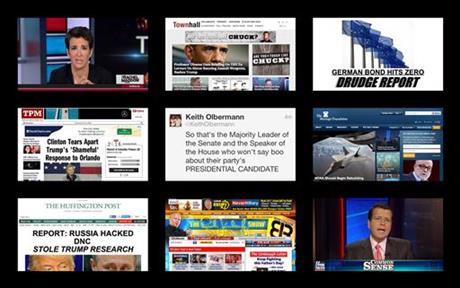DIVIDED AMERICA: Constructing our own intellectual ghettos
NEW YORK (AP) — Meet Peggy Albrecht and John Dearth. Albrecht is a free-lance writer and comedian from Los Angeles who loves Bernie Sanders. Dearth, a retiree from Carmel, Indiana, grew up a Democrat but flipped with Ronald Reagan. He’s a Trump guy.
They live in the same country, but as far as their news consumption goes, they might as well live on different planets.
Abrecht watches MSNBC’s Rachel Maddow each night. She scans left-leaning websites Daily Kos, Talking Points Memo and Down With Tyranny, where recent headlines described Donald Trump as “pathetic” and “temperamentally unfit” to be president. The liberal website Think Progress sends her email alerts.
Dearth is a fan of Fox Business Network anchors Neil Cavuto and Stuart Varney. He checks the Drudge Report, Town Hall and Heritage Foundation websites, where recent stories talked about Trump supporters being “terrorized” by demonstrators. Because of his search history, he’s bombarded with solicitations to donate to conservative causes.
In a simpler time, Albrecht and Dearth might have gathered at a common television hearth to watch Walter Cronkite deliver the evening news.
But the growth in partisan media over the past two decades has enabled Americans to retreat into tribes of like-minded people who get news filtered through particular world views. Fox News Channel and Talking Points Memo thrive, with audiences that rarely intersect. What’s big news in one world is ignored in another. Conspiracy theories sprout, anger abounds and the truth becomes ever more elusive.
In this world of hundreds of channels and uncounted websites, of exquisitely targeted advertising and unbridled social media, it is easy to construct your own intellectual ghetto, however damaging that might be to the ideal of the free exchange of ideas.
“Right now the left plays to the left and the right plays to the right,” said Glenn Beck, the former Fox News host who started TheBlaze, a conservative network, in 2010. “That’s why we keep ratcheting up the heat. We’re throwing red meat. We’re in a room that is an echo chamber, and everybody’s cheering.”
Albrecht and Dearth don’t rely exclusively on partisan media. Albrecht starts her day with the Los Angeles Times, and Dearth occasionally flips to MSNBC to hear opposing viewpoints, particularly on “Morning Joe.” They do share mirrored misgivings about the major broadcast networks, newspapers and their related websites — the mainstream media — though Dearth thinks it’s too liberal and Albrecht considers it too conservative.
That’s the kind of thinking that inspired Roger Ailes to launch Fox News Channel in 1996. The former GOP operative mixed news during the day with a prime-time lineup that appealed to conservatives.
By 2002, Fox had raced past CNN to become the top-rated news network, beginning the golden age of partisan media.
There wasn’t anything to compare on the left, at least until summer 2006 when Keith Olbermann began a series of commentaries after being angered by a speech where Defense Secretary Donald Rumsfeld equated Iraq War opponents to pre-World War II appeasers. His show became home for disaffected liberals in the Bush administration’s final years. MSNBC hired Maddow and eventually made the entire network left-leaning, although low ratings forced it back to news during the day.
Fueled by Fox’s primacy and opposition to the war in Iraq, liberals began finding their voice online in the early 2000s.
Writer Josh Marshall began blogging and reporting, developing the Talking Points Memo website. His work forced wider attention to issues like the firing of U.S. attorneys in the Bush administration, Republican voter suppression efforts and the fight against Social Security privatization. TPM has grown to 25 employees with offices in Washington and New York.
Others followed Marshall’s path. Conservatives took advantage of new media, too.
“I don’t think it’s as much a danger to democracy as people think it is,” Olbermann said. “When the business changes to being all conservative media or all liberal media — though I don’t know how that would happen — that’s when it becomes dangerous.”
Yet today’s political media get at least some of the blame for a hardening of attitudes. A generation ago, majorities in each political party described themselves as moderate. Now 62 percent of the Democratic primary electorate identify themselves as liberal, and 76 percent of Republicans say they’re conservative, according to ABC News exit polling.
Marty Baron, executive editor of The Washington Post, spoke with some distress this spring at the commencement of Temple University’s School of Media and Communication.
“Today we are not so much communicating as miscommunicating,” he said. “Or failing to communicate. Or choosing to communicate only with those who think as we do. Or communicating in a manner that is wholly detached from reality. Too often we look only for affirmation of our own ideas rather than opening ourselves to the ideas of others.”
That thought was on Beck’s mind when he had lunch a year ago with Arianna Huffington, founder of the left-leaning news site that bears her name. They talked about the need for an outlet where a conservative can talk about ideas to a liberal audience and vice versa.
But for now, nothing’s come of the idea.
___
Follow David Bauder at twitter.com/dbauder. His work can be found at http://bigstory.ap.org/content/david-bauder





No Comment